Collaborative Decision-Making with Communities
To begin, select a question of interest, and content will display at the bottom of the page. Click another question at any time to load new content.
Evidence-Based Behavioral Practice
Welcome to the Evidence Based Practice course for collaborative decision making, brought to you by the EBBP project and Northwestern University’s Department of Preventive Medicine.
This course is one of a series that looks at shared decision-making in a variety of settings, from working with individual clients to implementing programs for entire communities.
In this course, you’ll assume the role of Samantha Dole, the program manager at a local health department that’s working to implement initiatives within her community to increase physical activity and promote a healthy diet and lifestyle. The goal of these initiatives will be to prevent obesity within communities under the department’s supervision.
According to the Behavioral Risk Factor Surveillance System, or BRFSS, the world’s largest, ongoing telephone health survey system, 63.1% of all Americans are either overweight or obese.
Public health educators across the country are hard at work to change policies and environments – as well as attitudes and behavior – to improve the health of their communities.
This training is intended for a wide-ranging audience, including health and public health practitioners, both experienced and new to the field, as well as graduate students working towards a career in health – providing a safe environment for you to apply and refine your decision-making skills by implementing the Evidence-Based Practice Three Circles model.
Evidence-Based Practice Three Circles Model
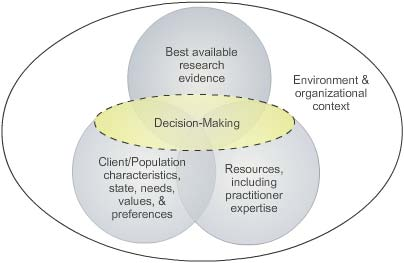
As you work through the upcoming case, you will learn how to:
- Define collaborative decision-making
- Describe the rationale for collaborative decision-making in evidence-based practice
- Identify at least three discrepancies or barriers that can arise between community preferences, resources, and scientific evidence
If you would like to review some additional content on evidence-based l practice before getting started, you can visit the training portion of the EBBP.org home page.
When determining a course of action to take with a community program, it's important to take into consideration the three elements of EBBP.
The three elements, or circles, of EBBP, are:
- The best available research evidence
- Community characteristics, including preferences
- Resources accessible to providers and participants of the program
The three elements, or circles, of EBBP, are all influenced by the Environmental and Organizational Context.
You integrate each of these three elements through a collaborative decision making process that involves working with the community – conveying information about your programs clearly and respectfully.
After clearly explaining prevention options, it’s advisable to listen to community concerns, consider available resources, negotiate options, and adjust strategies, as appropriate to achieve agreement on a course of action.
Five Steps of Evidence-Based Practice
The EBBP process begins with an assessment of the client or community. It then proceeds, iteratively, through the following five steps:
- ASK relevant, answerable questions about the health status, context, and resources of the client or community
- ACQUIRE the best available evidence to answer the question.
- APPRAISE the evidence critically for validity and applicability to the problem at hand.
- APPLY the evidence by engaging in collaborative decision making with the affected groups – this is where the three circles of EBBP are put into practice.
- ANALYZE the effects of the new health program or treatment plan, and ADJUST practices accordingly.
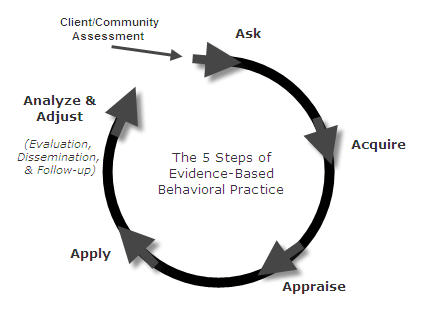
Formulating Strategy
As the program manager at a local health department that’s working to implement initiatives to increase physical activity and promote a healthy diet and lifestyle, your team will focus on one particular program being conducted for a specific urban, low-income, predominantly Hispanic community.
You and your health department team are reviewing interventions and planning budgets, including grant writing efforts that would assist the urban, low-income, Hispanic community of Middletown.
As Brad and Jeff examine the best available evidence while Lauren helps to conduct a needs assessment at a community forum to establish the community’s priorities.
It’s imperative that a community’s stakeholders have a voice in the direction of projects with a wide-reaching impact. The community’s early engagement and input will increase the chances that the partnership and any obesity programming will succeed.
Lauren returns from the forum with the results of her needs assessment. In addition to attending the forum, the health department team conducted phone and mail surveys with the community and brainstormed with community health experts in the area and within the health department.
The Middletown community seems in favor of programs that would get people out of doors, promote health, support community and families, improve the neighborhood image, and improve safety from crime.
Now it’s up to you and your team to formulate strategies that can effectively meet these community values and preferences.
Two-Step Program Strategy
Lauren spends a little more time researching evidence-based interventions and develops a two-step program strategy.
Part One involves enhancing the walking infrastructure by creating or renovating walking trails within the community. Part Two will focus on a nutrition education program.
She feels these interventions align well with the values and preferences expressed by the community.
Grant Proposal
Your health department team did a great job linking the evidence-based recommendations from the Community Guide and the suggestions from the community. The program laid out in your grant proposal is designed to improve the health of the community by reducing obesity and related health risks by increasing healthy food consumption and physical activity within the urban, low-income, Hispanic community of Middletown.
The Angela Martinez Foundation is impressed with your efforts and awards you a four-year grant for obesity prevention.
You and your team have completed the Ask, Acquire, and Appraise stages within the 5 Steps of EBBP, and are now ready to begin the Apply Stage by rolling out a program called “¡Movimiento para la Salud (Move for Life)!”.
This first two years of the program will marry outreach efforts with infrastructure development to increase locations and opportunities for physical activity in the community. You know that by deciding to couple infrastructure and outreach efforts you will have to watch your resources carefully and might have to sacrifice or make compromises to make such a large endeavor feasible.
Presenting to the Community
An advisory committee made up of members of the community was convened upon the initial approval of the grant to consider plans for interventions in detail. They outlined a plan in conjunction with the health department and are meeting again to discuss the best ways to move forward.
These members of the community will provide a great support system that you can collaborate with to evaluate intervention options and make adjustments when necessary throughout the life of the grant.
You are about to present the “¡Movimiento para la Salud (Move for Life)!” program designed to improve the health of the Hispanic community to Middletown residents at a local high school’s auditorium.
After conducting a thorough investigation of the available research evidence for programs with similar goals, and working with the advisory committee, your team concluded that the evidence supports enhancing the community’s walking infrastructure by creating or renovating walking trails.
The evidence also suggested an accompanying outreach effort to promote the new trails and physical activity within the target community.
As the community meeting begins, you and the health department team begin unveiling the “¡Movimiento para la Salud (Move for Life)!” plans for the obesity prevention program.
You announce that this year, the focus will be on physical activity, and the team begins giving a more detailed look into the evidence supporting the effectiveness of the creation of, or enhanced access to, places for physical activity.
The health department is planning to use the donated land they‘ve received from BigCorp to create a walking path in the community.
Year Two of the obesity prevention program will promote the new walking trail and other increased forms of physical activity with an extensive outreach program including local television advertisements and work site programs
Question and Answer Session
Now that your staff has completed the presentation, you begin to lead a question and answer session with the people in the community who have taken an interest in the project.
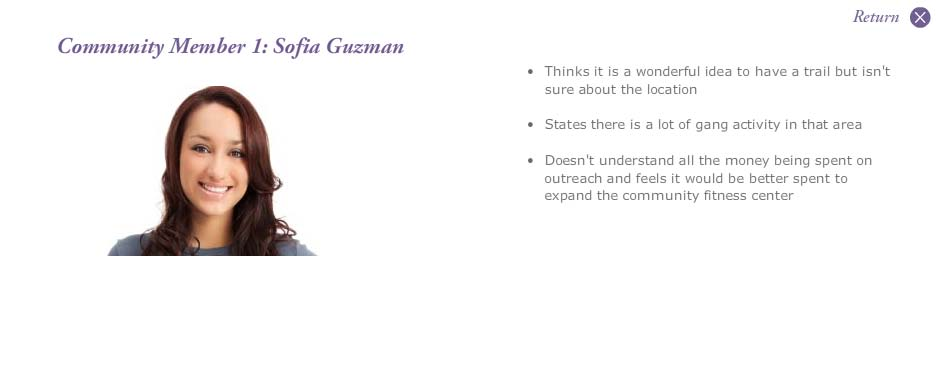
The meeting was highly productive and helped your team get a better sense of the community’s preference for this program. While community members are generally in support of walking trails, they are:
- Nervous about the safety of walking around in their neighborhood
- Concerned the level of criminal activity after dark would serve as a deterrent to trail use
- Suggesting a track to be built connected to the local community fitness center because it is off of a main road in an area that is well-populated and offers the added benefit of encouraging family activity.
Making Critical Decisions
While the community has clearly voiced their opinion, showing strong support for an outdoor track connected to the local community fitness center, this would be a more expensive option due to the need to purchase that land - impacting the funds left for the Year Two outreach initiatives.
Select how you would like to proceed.
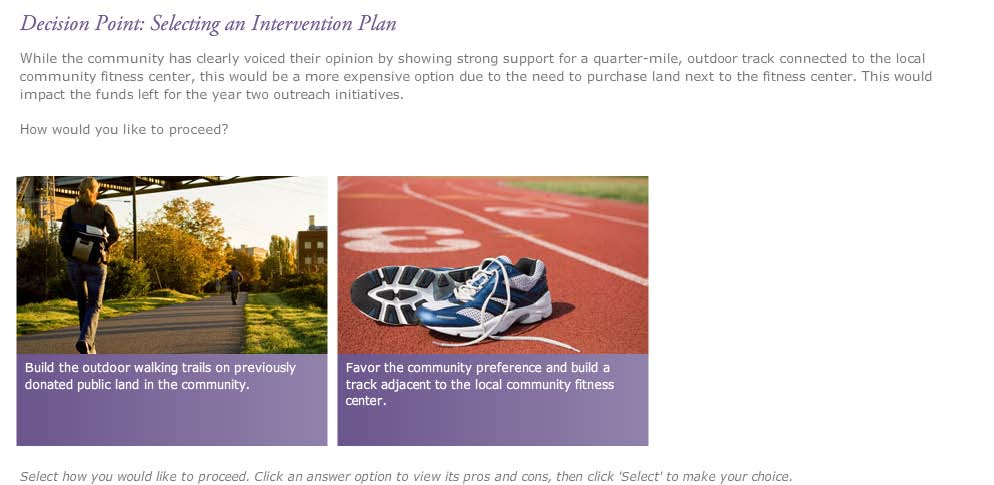
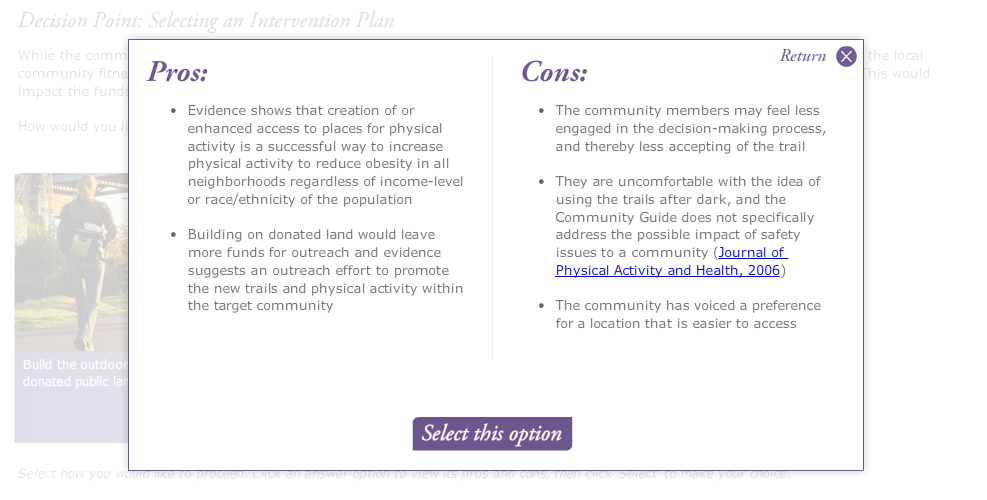
Back when your health department team decided to couple infrastructure and outreach efforts for your grant proposal, you did so knowing that you might have to sacrifice or make compromises to make such a large endeavor feasible. As you consider the information collected from the community forum, you are approached by City Council Member Torres about an alternate plan.
He’s been meeting with developers and is requesting that the health department consider plans for a new gym on the land instead of the trail. It would include a track much like the one the community members talked about at the meeting, and would be safer because it's indoors – with state of the art work-out facilities and amenities.
It’s an interesting idea, but not exactly in line with the program’s objectives of assisting the lower income residents of Middletown.
After you meet with City Council Member Torres, you decide to do a little research regarding his policies and history with the health department. Lauren offers to assist and puts together this report.
Prioritizing Evidence-Based Approaches
You have considered the City Council Member’s history and track record, and the input from the community forum.
Select how you would like to proceed.
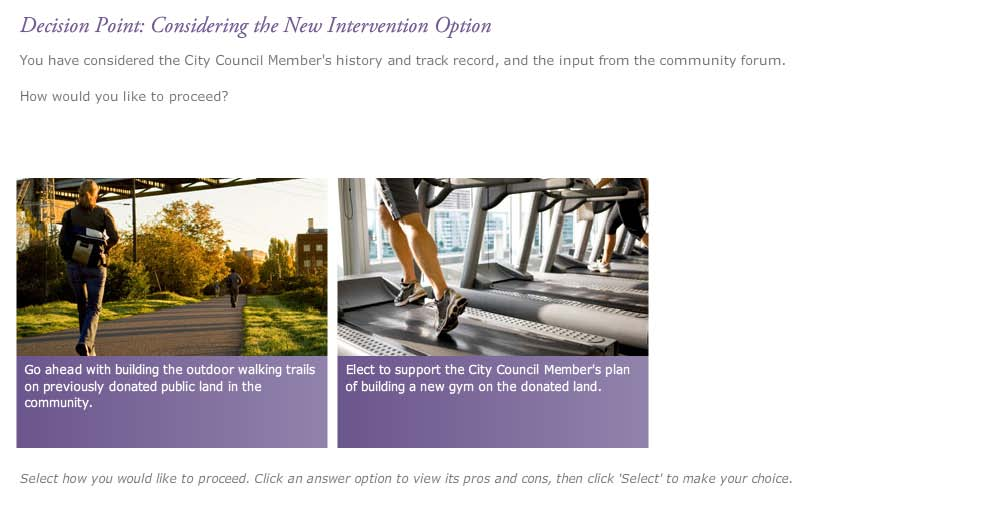
With this decision you prioritized the evidence- based approach presented in the Community Guide without much consideration for the opinions of the various stakeholders. There were plenty of funds left for resources since the trail was built on donated land.
The outreach program brought back some of the community, but crime and safety concerns led to only marginal success with this intervention. The City Council Member focused his efforts elsewhere causing you to lose key political support that could have made the building process and outreach efforts much easier.
While this approach was the best available based on the research evidence, there are three circles of Evidence-Based Practice to consider when practicing collaborative decision making – the evidence, available resources, and community preference. Considering the preferences of all relevant stakeholders, such as the City Council Member and the Middletown community, is essential to success.
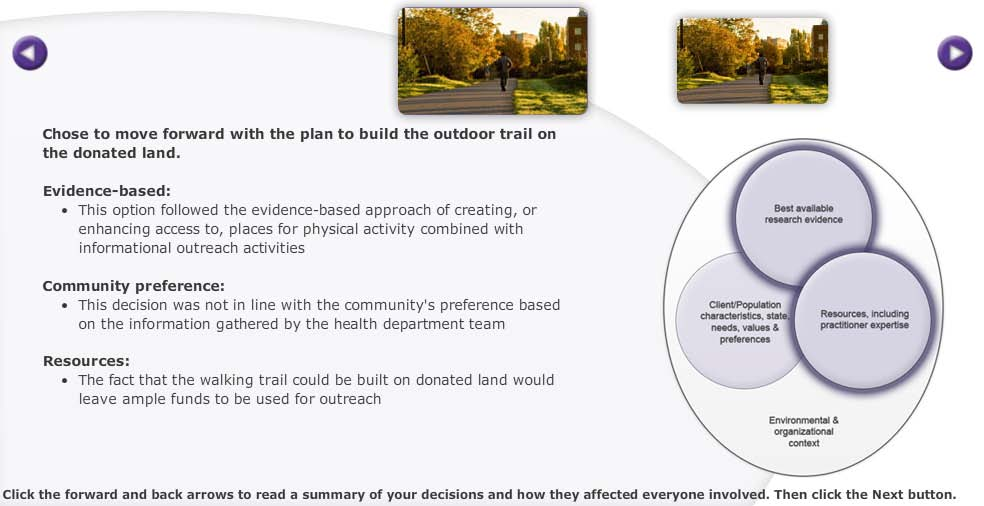
Decision Map
Here is a decisional map showing the path you just completed based on your decisions. If you would like to go back to a specific decision point and explore another outcome, click the decision point on the map to return to that screen.
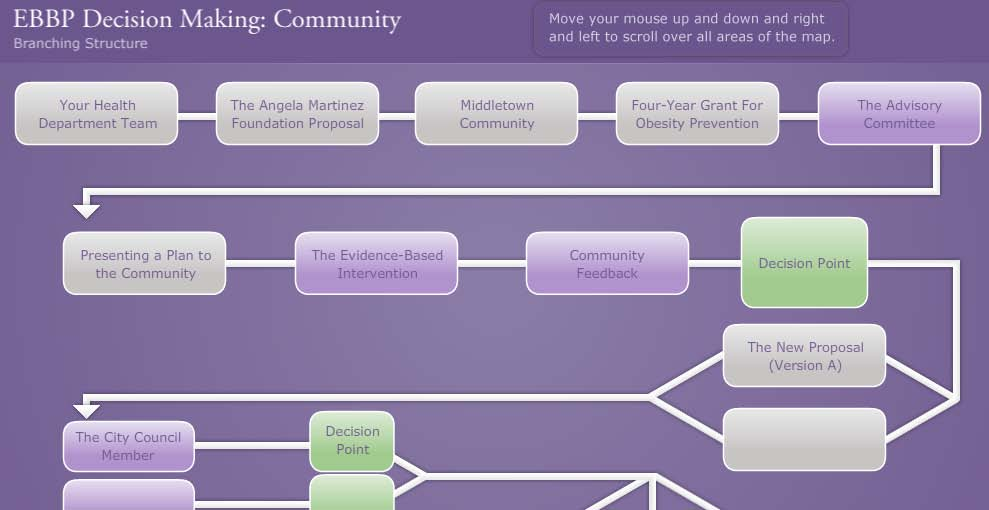
To explore a path you haven’t seen, you must go back to the decision point that begins that path so that you view all the necessary information.
The decision points are the green colored boxes on the map.
You can try the scenario again from the beginning by clicking the Next button to return to the main menu.
Thank you for your participation. We hope that this course has provided you with some insight to applying the principles of evidence-based practice and striking a balance between the three EBBP circles: the best